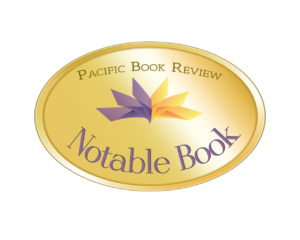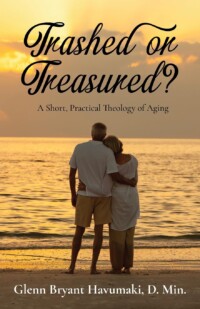Title: Trashed or Treasured?
Subtitle: A Short, Practical Theology of Aging
Author: Glenn Bryant Havumaki, D. Min.
Publisher: Arpress
ISBN: 979-8893304022
Pages: 142
Genre: Non-Fiction / Christian Literature / Self-help
Reviewer: Ephantus M.
Pacific Book Review
 Trashed or Treasured?, by author Glenn Bryant Havumaki, is a rare gem which uses discarded or overlooked items as a lens to explore human experiences and emotions. It invites the reader to sit down and look at the world – and themselves – a little differently, through Havumaki’s journey of recollections, losses, and small but significant revelations.
Trashed or Treasured?, by author Glenn Bryant Havumaki, is a rare gem which uses discarded or overlooked items as a lens to explore human experiences and emotions. It invites the reader to sit down and look at the world – and themselves – a little differently, through Havumaki’s journey of recollections, losses, and small but significant revelations.
This book’s focus is on transformation of both objects and the human heart, with Havumaki gently and skillfully guiding readers through stories of discarded items; those things that people have thrown away, overlooked, or deemed worthless. With a keen eye and tenderness, he “rescues” these lost objects, and through them, he unearths stories that are full of hidden value. Whether it’s an old tool, a forgotten photograph, or a piece of furniture, he ably makes each item become a springboard into memory, reflection, and sometimes even healing.
But this book isn’t just about things, but more so about people. Through the concept of “rescuing” objects, Havumaki beautifully explores what humans value, what they leave behind, and how the simplest things many times hold the deepest meaning. He ably reminds readers that what they choose to treasure says something about who they really are. Readers will absolutely walk away with a fresh appreciation for the ordinary and thus may find themselves eyeing their attic and wondering what treasures they may have overlooked.
What sets Trashed or Treasured? apart is its grounding in Christian faith and the belief that every life, especially in old age, is precious and purposeful. Remarkably, Havumaki has woven biblical truths throughout, that investigates how to treat older adults and how that reflects on the spiritual health of those offering care within the church, families, and communities alike. He has largely emphasized the need to reconnect with and care for the elderly, encouraging communities to help older adults find meaning and ways to serve God until their final days.
Havumaki’s writing is friendly, conversational, and genuine, and his charm is deeply rooted in genuineness rather than in flawless perfection. His word choice is simple but meaningful and the prose flows like a gentle conversation rather than a formal essay. His words are characterized by humility and a sense of humanity, drawing the readers into his world and enabling them to accept his viewpoint early on. Not to be forgotten is the simplicity of his language, which dangles not in complexity but in sincerity and the ability to arouse deep emotions and reflections.
Readers will find Trashed or Treasured? a wonderful book on hidden gems in life and a gentle nudge to look closer, listen deeper, and cherish more. It will leave the astute reader smiling, thinking, and feeling more connected to the small, everyday wonders around them. Those looking for something reflective, soul-warming, and deeply human will find it a quiet treasure worth adding to their shelf. If you’ve ever wondered whether the “junk” around you holds a secret story, this book will convince you to listen or even maybe go treasure hunting yourself.


